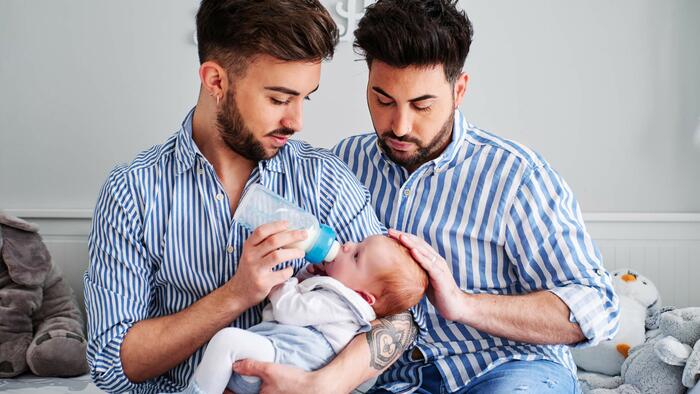The recent trend of gay and transgender couples using surrogate mothers for childbearing raises significant concerns about cultural respect for motherhood and the treatment of children as mere props for social validation. This phenomenon has been showcased prominently on social media, where some couples, often gay or transgender men, share photos that present them as if they have given birth, thus reinforcing a sense of entitlement to motherhood without recognizing the complexities and responsibilities it entails. The unsettling nature of these portrayals raises questions about the implications for children’s well-being, especially when their existence is framed as a means to achieve social media popularity rather than a cherished addition to a family. The commercial nature of surrogacy in these contexts can culminate in children being used as fashionable accessories, leading to ethical considerations regarding their future stability and identity.
The discourse surrounding surrogacy has become increasingly contentious, as illustrated by the Italian government’s recent legislative action under Prime Minister Giorgia Meloni. Meloni’s administration has imposed a blanket ban on surrogacy, including overseas arrangements, signaling a significant shift in the political landscape toward preserving traditional family structures. This ban encompasses all Italian citizens, not solely those within the LGBTQ community, but critics argue that the law disproportionately targets gay couples seeking to build families. Meloni’s strong advocacy for traditional family values reflects a broader cultural sentiment that values a man-woman parenting model, positing that children thrive best in conventional family settings. Political moves like Meloni’s draw attention to a resurgence of conservative ideologies that challenge the progress made by LGBTQ rights movements in recent decades.
Scientific data surrounding the implications of growing up in LGBTQ households suggests potential long-term risks for children, contrasting sharply with the prevailing narrative that all family structures are equivalent in fostering healthy child development. Though limited, existing studies indicate that children raised in non-traditional settings may face various social and psychological challenges, including heightened anxiety, depression, and increased vulnerability to engaging in unhealthy risky behaviors. The difficulties encountered by these children, as indicated by research, have been largely overlooked in the prevailing discourse due to backlash from LGBTQ advocacy groups, who invoke claims of “bigotry” whenever negative findings emerge. This suppression of unbiased research fosters an environment where the complexities of LGBTQ parenting and surrogacy remain inadequately examined, leaving potential concerns unaddressed.
Proponents of surrogacy dismiss bans as unreasonable, often citing demographic arguments regarding declining birth rates in Western societies. In Italy, advocates for LGBTQ rights assert that surrogacy represents a viable solution for increasing population numbers alongside societal progress. However, critics contend that merely increasing birth rates is insufficient if the focus is not on ensuring that children are raised in nurturing environments. The notion that children should not be viewed as pawns for the fulfillment of adult desires or social status is central to the conversation. Hence, the call for stable and loving familial structures is paramount in any discussion about surrogacy, signaling that societal well-being must take precedence over individual aspirations for social media fame.
The implications of surrogacy extend beyond individual families and touch upon broader societal values and priorities. Questions about not only the ethical dimensions of surrogacy but also the potential commodification of motherhood are raised in discussions about gay and trans couples acquiring children. This commodification highlights significant social implications, particularly when children are viewed as vehicles for adult expression rather than as individuals deserving of care and respect. Such concerns indicate a troubling trend in which the intricacies of parent-child relationships might be overlooked in pursuit of validation through media platforms, drawing into question the long-term psychological and emotional health of children in these situations.
In conclusion, the unfolding debate surrounding surrogacy, particularly in the context of gay and trans couples, reflects deep-seated cultural tensions regarding gender, family structures, and child welfare. As governments like Italy’s take steps to limit surrogacy, the discourse may lead to a reevaluation of what constitutes a suitable environment for raising children and who should have the privilege of parenting. The need for further unbiased research and open dialogue about the diverse experiences of children raised in LGBTQ households remains critical as society navigates these complex issues. Ultimately, ensuring the well-being of children and placing them at the forefront of these discussions may lead to more informed and compassionate policies that prioritize their needs over the spectacle of modern parenting dynamics.

